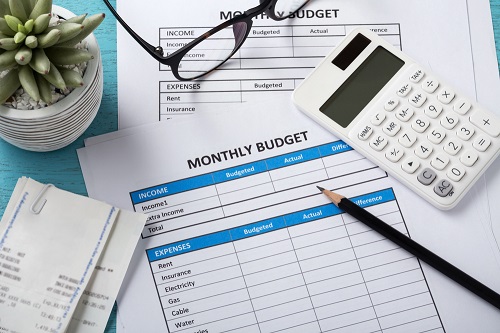Tips for Having a Better Budget
We all want to make sure we are putting our hard-earned money to the best use possible. With bills, rent or mortgage, groceries and other expenses, there is a lot to keep track of. That’s why keeping a budget is a smart idea1 to monitor how much and where you are spending each month. If you already have a set budget going, we have a few tips to help make it even better. Keep reading to find out how.
Set realistic expectations.
We all want to feel like we’re using our money wisely, but unfortunately that isn’t always the case as 79% of people report overspending2 and failing to stick to their budget. When you sit down to figure out your planned expenses for the month, set realistic expectations. Try to base your planned expenses off the previous month’s expenses if you can. But if you can’t, try not to over or underestimate yourself. You might be hoping to save a lot for the month but be realistic about how much you expect to spend on food, entertainment, shopping and other expenses. That way, you won’t be shocked when you tally up and compare with your actual expenses at the end of the month.
Keep it somewhere visible.
Whether you keep track of your budget3 in a notebook, in a spreadsheet on your computer or on your phone, try to keep it in a visible place. If your budget is in a place where you can see it frequently, it’ll remind you to stay on track. For example, if you see what you’ve planned for eating out for the month, it can inspire you to not over-do it. Also, if you plan to add to your actual expenses as bills come in, having your budget visible helps makes it easier to keep your it up to date.
Remember to keep receipts and statements.
If you would rather wait until the end of the month to fill out the actual expenses section of your budget, be sure to collect your receipts4 and bill statements. Whether they are paper or electronic, keep them close at hand so you can have an accurate number. You can designate a special box or folder in your email to keep them organized until the time comes to enter them into your budget.
Identify problem areas.
Once you reach the end of the month, take a moment to review and compare. How did your actual expenses match up against your planned? Hopefully you were able to stick close to your budget. However, sometimes that doesn’t always happen. If you ended up spending more than you planned, find where your problem areas are. Did you spend too much on eating out? Did you buy too many new clothes or was your electric bill higher than expected? Set a goal to cut back on non-necessity expenses, like restaurants, or to learn how to save money on utility bills. By identifying the problem areas in your budget, you can turn to the next month with set goals on how to improve.
The views expressed by the articles and sites linked in this post do not necessarily reflect the opinions and policies of Cash Central or Community Choice Financial® .
Sources:
1Wiblin, Brent. (2021, Dec 27). Retrieved from: https://www.firstrepublic.com/insights-education/why-is-budgeting-important
2O’Brien, Sarah. (2019, Dec 26). Retrieved from: https://www.cnbc.com/2019/12/26/consumers-overspend-by-7400-a-year-here-are-weekly-trouble-spots.html
3NerdWallet. (2022, Oct 19). Retrieved from: https://www.nerdwallet.com/article/finance/tracking-monthly-expenses
4Ding, Jason. (2023, Mar 22). Retrieved from: https://www.freshbooks.com/hub/expenses/how-to-organize-receipts

 You must have JavaScript enabled to use this site.
You must have JavaScript enabled to use this site.
 For a better user experience consider upgrading your browser.
For a better user experience consider upgrading your browser.

